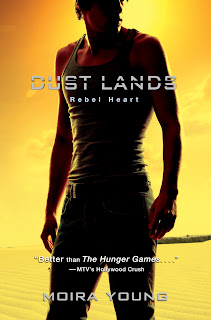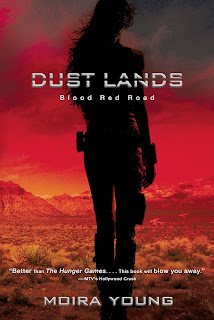Last week, I had the amazing opportunity to interview Moira Young, author of the Dust Lands series, by phone along with a couple of other bloggers. Chatting with her and getting some very specific insights into the world of the Dust Lands, the characters and particularly the language of the books was, in a word, awesome. I adore this series and cannot wait to see what happens in Book 3.
Below is the transcript from my conversation with Moira. Check out Mundie Moms, Page Turners Blog and Supernatural Snark to see their interviews.
 |
| Moira Young |
And it's basically a hero's journey. A western set in the future, I think, I would describe it as, amongst other things.
WPP: Ever since I started reading the series, I've been particularly interested in sort of the dialect and speech patterns and how that's reflected on the page. How did you get to that point? How did you sort of transcribe your characters?
Moira Young: Well, let me think now. What's the best way to talk about this?
You will have heard me talking about that early draft, which was in the third person. I didn't realize what I needed to find was her voice. And that’s why I was dissatisfied with that early version. It didn't feel authentic to me, it didn't feel like I was saying what I wanted to say, even though I wasn't quite sure what that was. I was searching for a way to tell this story about a girl whose brother had been kidnapped at some time in the future. That was the basis for it.
And I really had to, through my very long first draft, the one that took me so long to write, I started off, you know, in the third person. And by the time that draft ended up, I was inching towards Saba's voice. I had gone through periods of having her be eight years old, and she just gabbled. She would gabble in long, long, long sentences without any commas. I was trying to get into her head, I was trying to hear her.
And once I finished that first draft, I realized I wasn't going to be able to use any of it because it wasn't any kind of a coherent story. So I had to start again with a blank page.
I just sat quietly, hoping that I would know what to do, that it would come to me. And indeed, when I stopped all the chatter in my head telling me I'd wasted my time and this was just a terrible mistake, the whole thing, that I should learn to be a dentist or something, when I sat there, her voice came to me. And she started to speak. And it was this very clear voice. And I wrote down what I heard.
I realized that I would have to spell things in such a way that people would get an idea of the rhythms and how she spoke vowels, whether or not they were closed or open. And I also wanted to get a sense of the rhythm of the story in the way that the words were on the page and in the way people spoke. I wanted to get that energy moving through it.
It just came out in these very short lines. And the way it's set out on the page, it's really to show how I was hearing it when people they take a breath, when they have a change of thought, when they have a change of emotion. And that was my best way of going about it.
At a certain point, I really thought that I wanted to give up because it felt so inauthentic for me to be writing it down at all. I really felt like I should either be speaking it or I should be able to wire people into my head so they could hear her speaking in my head.
Of course, it drives my editor mad that I put things on different lines and she's always trying to pull them up into neat paragraphs so that it doesn't cost so much to print the book. But I keep pulling the lines apart again.
WPP: I live in Virginia, and I both listened to the audio book and read the book. It's hard to figure out because obviously it's a reflection of your character, but it sort of feels like an amalgamation of southern and some other regional dialects.
Moira Young: It's not actually a southern accent at all, and if it were, I think I would probably have failed quite badly with that. It's a rough illiterate, it's got elements of, well, practically everything I've ever heard. It's got elements of my Scottish father's slang, my grandfather from the Indian army, my husband's aunt from Nottingham Shore, London slang --it's a broken language. I wanted it to be a broken way of speaking that reflected the broken world, really. That's what it ended up being. That's what I realized was coming out.
And I wanted it to be dry, also, in that way that the land is dry and their life is harsh. I wanted it to be simple and harsh and dry but with a very, very distinctive pulse in it and poetry and music even within that simplicity. That's what I realized I was working with when I came to the end of it and had to think about what I'd done.
WPP: I think that's what I enjoy about it so much, that it's so simple and so genuine that it--their speech and their intention comes across very pure.
Moira Young: I think it's the simplicity of the people for whom survival is hard. So what you say to people is direct. But even still, they talk about the stars and how they feel and all that kind of thing, as well.
WPP: Well, I can't not ask because I have to say, as far as romantic elements, particularly in Blood Red Road, you have one of the best pairings of characters and I've thoroughly enjoyed it.
You have these two people who are very hard eggs to crack in Saba and Jack who wind up in this relationship or non-relationship. Neither one of them is really willing to admit it at first. You have such a unique delivery on things that are not romantic, but they come off as being romantic. And I have to say, when Jack sings "Hard Hearted Annie", I about died.
How did you craft the relationship between the two of them?
Moira Young: Oh, I would like to pretend that I crafted it. The thing about Jack is he is the easiest character to write of anybody. I don’t think I've ever had to change anything that Jack has said because he's a very interesting character. He just springs to life immediately. He's very present, and I know exactly what he's going to say. He just says it. And I go, oh, okay, fine, I'll write that down.
I think that for whole relationship between Jack and Saba-- a writer draws on all of their influences. You draw on the well that's been filled up throughout your life of reading and watching movies and observing other people and being in relationships yourself and all this kind of thing.
I think that their relationship owes a huge amount to Film Noir, so it will owe a lot to, Bogart and Bacall or Bogart and Mary Astor in The Maltese Falcon or any number of those '40s films where you've got very smart women. It also owes a lot to The Philadelphia Story, between Cary Grant and Katharine Hepburn. All of those sorts of characters, and of course, the big epics of the '80s like Raiders of the Lost Ark and before that Star Wars and Harrison Ford with Princess Leia.
Those are all my romantic influences. I'm not interested in mushy romance at all. I like a relationship that's muscular and elbowy.
Obviously with two tough characters like that who are both very strong willed and tend to be strong standalone characters, when you put those two personalities together, you're bound to have a lot of tension and friction and not wanting to be the first one to admit to what might be perceived as weakness. That's for sure.
That song was very fun to write. I love that song. I like writing songs for my characters.
WPP: It was absolutely fantastic. I had this reaction of, oh, my God, that's so inappropriate and funny and strange at this particular moment. And at the same time, I went, but it's totally Jack.
Moira Young: Exactly. I just thought, oh, he's going to sing a song, I better write a song for him to sing. It's sort of like a sea shanty. I did write a much ruder version to start with, but then I thought that probably wouldn’t be a good idea.
Blood Red Roadby Moira Young
Saba has spent her whole life in Silverlake, a dried-up wasteland ravaged by constant sandstorms. The Wrecker civilization has long been destroyed, leaving only landfills for Saba and her family to scavenge from. That's fine by her, as long as her beloved twin brother Lugh is around. But when a monster sandstorm arrives, along with four cloaked horsemen, Saba's world is shattered. Lugh is captured, and Saba embarks on an epic quest to get him back.
Suddenly thrown into the lawless, ugly reality of the world outside of desolate Silverlake, Saba is lost without Lugh to guide her. So perhaps the most surprising thing of all is what Saba learns about herself: she's a fierce fighter, an unbeatable survivor, and a cunning opponent. And she has the power to take down a corrupt society from the inside. Teamed up with a handsome daredevil named Jack and a gang of girl revolutionaries called the Free Hawks, Saba stages a showdown that will change the course of her own civilization.
Rebel Heart
by Moira Young
Nothing is certain and no one is safe in the second book in the highly praised Dust Lands trilogy, which MTV’s Hollywood Crush blog called “better than The Hunger Games.”
It seemed so simple: Defeat the Tonton, rescue her kidnapped brother, Lugh, and then order would be restored to Saba’s world. Simplicity, however, has proved to be elusive. Now, Saba and her family travel west, headed for a better life and a longed-for reunion with Jack. But the fight for Lugh’s freedom has unleashed a new power in the dust lands, and a formidable new enemy is on the rise.
What is the truth about Jack? And how far will Saba go to get what she wants? In this much-anticipated follow-up to the riveting Blood Red Road, a fierce heroine finds herself at the crossroads of danger and destiny, betrayal and passion.
US/Canada only.











































Thanks for the giveaway! I've been dying to read Rebel Heart. Blood Red Road was my favorite read last year.
ReplyDelete